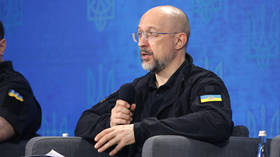US stalling on G7’s $50 billion loan to Ukraine – media

Washington is behind a delay in finalizing a G7 plan to grant Kiev a $50 billion loan financed by frozen Russian assets, Euractiv reported on Thursday, citing sources close to the discussions.
The EU and the US jointly froze an estimated $300 billion in Russian sovereign assets at the start of the Ukraine conflict in early 2022. Ever since, Western states have been mulling using the funds to aid Ukraine. While they have so far failed to agree on the outright confiscation of the money, the G7 decided in June to provide Ukraine with a $50 billion loan, to be paid back using interest from the frozen Russian funds.
However, according to Euractiv sources, the US has been hindering the process of finalizing the plan due to concerns over repayment, which depends on how permanent the freeze of assets is.
Under EU rules, the bloc renews sanctions targeting Russian assets every six months, and needs the unanimous approval of all 27 member states to do so. Diplomatic sources cited by the news outlet claim that Hungary, which currently holds the six-month rotating EU presidency, could at some point veto extending the freeze.
Washington has demanded more long-lasting guarantees that the assets will remain frozen despite potential disagreements within the bloc, Euractiv sources claim, so that the West can tap the immobilized funds for as long as needed. For instance, sources say the US suggested switching the bloc’s sanctions mechanism to 12 months or longer.
According to an earlier report by Financial Times, EU ambassadors have already discussed several proposals aimed at allaying US concerns, including extending the renewal of sanctions to three years or even indefinitely. However, no headway seems to have been made in that regard so far.
Meanwhile, Ukraine has been growing increasingly impatient over the promised money, with Prime Minister Denis Shmigal on Tuesday insisting that it should be received by the end of the year. He also stressed that Kiev wants the loan to be interest-free and “provided to Ukraine without any conditions.”
Moscow has denounced the asset freeze as “theft,” and repeatedly warned that tapping its funds would be illegal and could create a dangerous precedent, destroying the credibility of the Western financial system.
For more stories on economy & finance visit RT's business section













